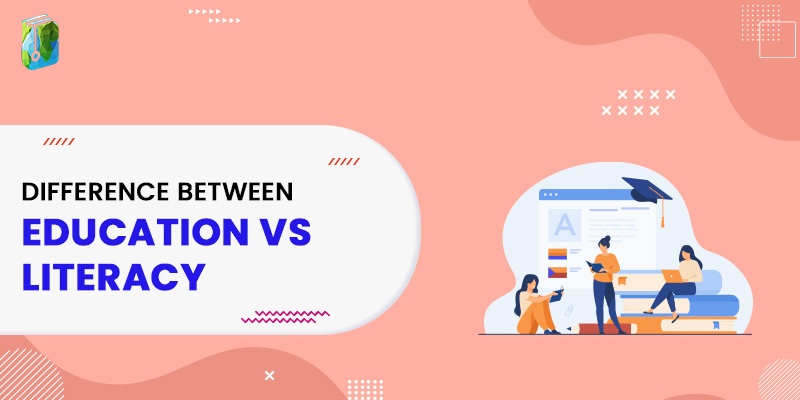Literacy refers to a person’s ability to read and write. While education means gaining knowledge about something through a structured organization. Literacy is an important factor in measuring the education level in a country. You need to know that literacy and education cannot be used interchangeably. Although people think education and literacy are the same, there is a difference between them.
Let’s understand the two in detail!
Difference between Education vs Literacy
Education
Education refers to knowledge acquisition by receiving or providing knowledge by following a systematic flow. Education is considered a basic human right and plays an important role in the progress of society as a whole.
In simple words, education is a formal education given by professional teachers and instructors in a school, college, and university. Formal education is divided into three different categories: primary, secondary, and higher secondary education.
The different stages of education are primary, secondary, college, and university. As we all know, education is mandatory and considered a basic human right. Students must receive education from schools and colleges after attending a certain age.
Literacy
Traditionally, literacy is a person’s capability to read and write. Nowadays, literacy is the ability of a person to use languages, numbers, letters, graphics, electronic gadgets, and more. Literacy also refers to identifying, understanding, analyzing, creating, and communicating with the help of printed and written materials.
Relationship Between Education And Literacy
- Literacy is a major factor that helps to measure the education level in our country.
- Being literate makes a person educated in terms of reading and writing, which helps them acquire knowledge.
Key Aspects of Education:
Formal Structure: Education typically follows a formal structure with established curricula, qualified educators, and recognized institutions. It progresses through different levels such as primary, secondary, and higher education.
Diversity of Subjects: A fundamental aspect of education is its diverse range of subjects. It covers areas like science, mathematics, humanities, arts, and vocational studies, offering individuals a broad spectrum of knowledge.
Holistic Development: Education focuses not only on cognitive development but also on emotional, social, and physical aspects. It aims to prepare individuals to become well-rounded, responsible citizens.
Certification and Degrees: Education often culminates in certifications, diplomas, or degrees, providing individuals with formal recognition of their achievements and qualifications.
Key Aspects of Literacy:
Basic Reading and Writing Skills: Literacy primarily involves the mastery of basic reading and writing skills. It enables individuals to understand written information, express thoughts coherently, and participate effectively in written communication.
Functional Literacy: Beyond basic skills, functional literacy includes the ability to apply reading and writing in practical situations. This encompasses tasks like interpreting instructions, filling out forms, and engaging with written materials in everyday life.
Lifelong Learning: Literacy is not confined to formal education. It extends into lifelong learning, allowing individuals to adapt to new information, technologies, and communication methods throughout their lives.
Foundation for Further Education: Literacy serves as a foundation for higher education. Proficient reading and writing skills are prerequisites for engaging with complex subjects and advanced knowledge.
Conclusion: Tabular Comparison Between Education And Literacy
Here we explained the difference between education and literacy. Here is a quick overview of the difference between the two.
| Basis | Education | Literacy |
| Definition | Education is acquiring knowledge via receiving or giving education through a systematic process. | Literacy refers to the ability of a person to use numbers, language, photos, electronic gadgets, and other means of education to understand, communicate, and get the knowledge required. |
| Knowledge offered | Obtaining knowledge | Capability to read and write. |
We hope that this article helped you to gain clarity about the topic!

